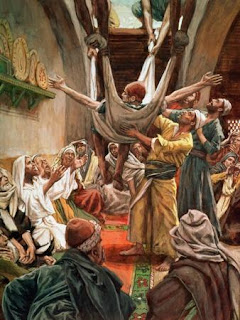Eighteenth Sunday after Pentecost
In the name of the Father, and of the Son, and of the Holy Spirit. Amen. In the mid 90s there was a song by the group Barenaked Ladies (ironically a band entirely made of up males) called “If I Had $1000000.” It’s a catchy tune, and it talks about all the things that the writer would do if he had a million dollars. He’d buy a house, furniture, a “reliant automobile,” a tree fort with a tiny fridge, a fur coat (“but not a real fur coat, that’s cruel”), an exotic pet like a llama or emu or monkey. We’ve probably all thought of what we could do with an unlimited or nearly unlimited amount of money at one time or another, and maybe our dreams have even included some of the things of which the Barenaked Ladies sang.
St. Paul, on the other hand, talks about becoming rich in Christ, so that no one wants for any grace while we wait for the return of our Lord. Probably not a catchy enough phrase for a song, but a chance to reflect on how we can truly be rich. Our world so often associates riches with material things and possessions. But St. Paul talks about the richness of a relationship with Christ and the openness to His grace.
Physical healings are amazing. They reveal God’s power over the human body, His ability to remake it as it should be. And physical miracles can help to bolster our faith in spiritual realities, like the communion of saints. But eventually whatever is healed will break down again. Skin, muscle, organs, and bones will decompose, and then what will we have left? But with spiritual healing, the effects can last into eternity, possibly snatching us from the teeth of the devil in Hell to the loving embrace of God in heaven.
And even on earth, we can have opportunities to realize that material things, while nice, do not have as much value as intangible things. For my birthday I received gifts from my family and from parishioners, for which I am very grateful. I received a gift card to a brand of hotels in which I often stay to help lower my cost of future travel. I received some cash and other gift cards with helped me purchase some items on my personal wish list. And I received some very kind birthday cards. But honestly, and with no ingratitude intended to anyone who gave me a gift, my best present was the chance for my very busy best friend to set aside time to spend with me, and let me know that, for that evening, he didn’t have anywhere else to be and didn’t have to cut out early to do anything else. As MasterCard used to remind us, while you can buy many things with a credit card, the best things in life are priceless.
So do we see God’s grace that way? Do we view our relationship with God as our most treasured gift? This is not to say that we can’t have material things that are precious to us, but do we treasure God above even our most expensive goods? Do we treasure Him even above the intangible things on earth? Or does God take second, or third, or fourth place when we consider what we value most?
Do we appreciate the treasure that confession is? God gave us a sensible way to receive His forgiveness through the Sacrament of Penance. We hear the priest, acting in the person of Christ the head, in persona Christi capitis, telling us that our sins are forgiven. Especially with my analytical mind, I can’t imagine simply asking God for forgiveness from my heart, but then wondering if I was truly sorry, which is the requisite for forgiveness. Instead, if I have at least imperfect contrition, a firm amendment not to sin in the future, and a willingness to do penance, and if I confess my grave sins in number and kind to the priest, I know, I have certainty, that God has forgiven me; no ifs, ands, or buts. What a treasure that is! Can God forgive me without the sacrament? Certainly. But we will only know if that happened at the end of our life when we meet God for our final judgment. Through the Church that Christ Himself founded, I can have confidence that those sins won’t be brought up at my final judgement, because Christ has washed them away in His Precious Blood.
One million dollars is an impressive amount of money. It can buy a lot of things that can help us live a comfortable life while on earth. But the comfort that God wants for us doesn’t always come on earth, but lasts for eternity in heaven. Each day we have the opportunity to decide how we want to be rich. Do we want to strive primarily for the riches that can buy us a house, a car, or an emu? Or do we want to strive primarily for the riches of knowing Jesus Christ and receiving the graces He sends us? The two don’t always conflict, but one is always more important than the other. Even if, at the end of our life, the world does not recognize us as rich, may God see how we have worked for and received the riches that He showers upon us each day: His grace, and knowledge, and love. In the name of the Father, and of the Son, and of the Holy Spirit. Amen.
